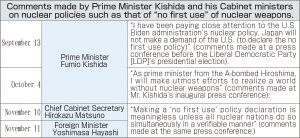Many of Prime Minister Kishida’s Cabinet ministers oppose U.S. move toward “no first use” policy; remain firm on need for U.S. nuclear umbrella
Nov. 24, 2021
A-bomb survivors question “shameful” government stance
by Koji Higuchi, Staff Writer
Some members of Prime Minister Fumio Kishida’s Cabinet have voiced in succession their opposition to the policy of “no first use” of nuclear weapons as considered by the U.S. Biden administration. The stance is an indication of the A-bombed nation’s government reliance on the nuclear umbrella and concerns about the weakening of U.S. nuclear deterrence against China and other nations. Although some nuclear disarmament experts have expressed sympathy toward the government’s position, A-bomb survivors’ groups and other organizations have revealed their discouragement and disappointment about why Japan’s national government cannot agree with a policy that could lead to nuclear disarmament.
A declaration stating that nuclear weapons would not be used before an adversary nation’s use of the weapons is said to have the benefit of limiting the objectives of the possession of nuclear weapons to deterrence of, and retaliation against, nuclear attacks, and in that way reducing the hurdle blocking nuclear nations from decreasing their nuclear arsenals. The Biden administration is looking into adopting the no first use policy in the process of compiling the administration’s new nuclear strategy known as the Nuclear Posture Review (NPR). U.S. allies including Japan are thought to have communicated their concerns about adoption of the policy.
Japan stresses need for all nuclear powers to “walk in step”
Prime Minister Fumio Kishida, elected from the A-bombed city of Hiroshima (representing Hiroshima Prefecture’s District No. 1), has declared the elimination of nuclear weapons to be his life’s work. Mr. Kishida has not made official mention of his assessment of the U.S. policy, but his Cabinet ministers have repeatedly made critical comments.
At a press conference held on November 10, Chief Cabinet Secretary Hirokazu Matsuno, the government’s spokesperson, said, “Making a ‘no first use’ policy declaration is meaningless unless all nuclear nations do so simultaneously in a verifiable manner.”
With threats from North Korea and other nations in mind, one senior official at Japan’s Ministry of Foreign Affairs said, “The policy isn’t effective in the current phase in which all nuclear powers are not in alignment regarding the issue of not using nuclear weapons first.” Such statements reveal the reliance of Japan’s national government on U.S. nuclear saber-rattling for its national security and its opposition to the weakening of U.S. nuclear power. On November 11, Foreign Minister Yoshimasa Hayashi (representing Yamaguchi Prefecture’s District No. 3) also expressed reservations about adoption of the policy, using wording similar to that expressed by Mr. Matsuno.
In 2016, when discussions on adoption of the policy were underway in the then U.S. President Barack Obama administration, for which Mr. Biden served as vice president, Japan expressed its opposition to the policy to the U.S. behind the scenes, which led to the U.S. decision to abandon the idea.
Diplomatic efforts are top priority
Nobumasa Akiyama, professor at Hitotsubashi University and an expert in the area of nuclear disarmament and non-proliferation, showed sympathy for the government’s stance. “As seen in the example of the U.S.-China relationship, deep mutual distrust has taken root. If the U.S. were to make the declaration unilaterally, Japan is concerned that China could misinterpret the U.S. as exhibiting vulnerability.” At the same time, Mr. Akiyama urged the Japanese government to make more diplomatic efforts. “To create an environment in which the no first use policy can yield a positive outcome should be first done through dialogue,” argued Mr. Akiyama.
Meanwhile, Hajime Matsukubo, secretary general of the Citizens’ Nuclear Information Center, a non-profit organization (NPO) based in Tokyo, has predicted that the U.S. would review adoption of the no first use policy with initiation of the Biden administration, and has called on both the ruling and opposition parties in Japan to not oppose the policy. Mr. Matsukubo’s reasoning involves his consideration that adoption of the policy would be an opportunity to limit the use of nuclear weapons and significantly reduce the risk of nuclear conflict. He requests that the Kishida administration not rigidly adhere to the conventional view held by the government to this point in time but to change to a stance supportive of the U.S. no first use policy declaration.
About a month and a half has passed since Mr. Kishida assumed the post of Japan’s prime minister. At his inaugural press conference, Mr. Kishida said, “I will make utmost efforts to realize a world without nuclear weapons,” but he has thus far shown no difference from the previous administration regarding the country’s nuclear policy. Terumi Tanaka, 89, co-chair of the Japan Confederation of A- and H-Bomb Sufferers Organizations (Nihon Hidankyo), argued, “As the only nation to have suffered an atomic bombing, it is shameful that our government hasn’t changed its stance of clinging to the U.S. nuclear umbrella. I hope Mr. Kishida, as a leader elected from the A-bombed Hiroshima, will take concrete action to eliminate nuclear weapons as soon as possible.”
(Originally published on November 24, 2021)








